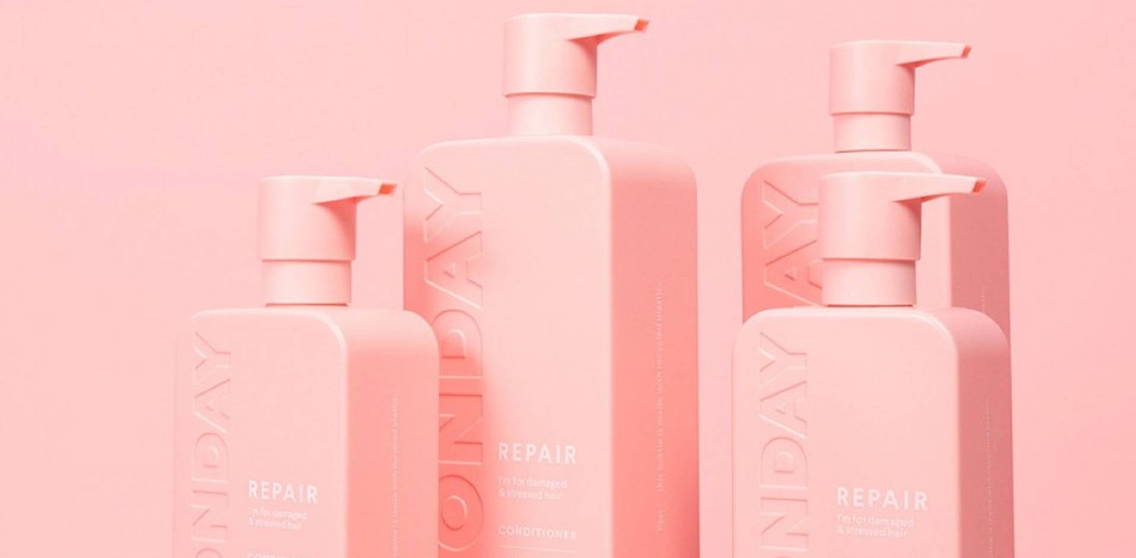Monday is a hair-care brand worth keeping an eye on.
When Monday launched in New Zealand and Australia in 2019, it gained a 26% share of the mass hair-care market in those markets in four weeks, outselling the market leader at the time, Pantene, said Jaimee Lupton, founder of Monday. Since then, Monday has expanded to 12 countries, including the U.S. and the U.K., and it expects to earn $100 million in 2022 sales while retaining profitability. Monday is owned by Zuru Edge, the consumer goods division of Zuru Group, which manufactures toys. Zuru Edge also developed the collagen ingestible brand Dose & Co, among other brands.
Monday does not sell via DTC and currently has no plans to. Instead, its U.S. website directs people to purchase products via Ulta.com. In addition to Ulta Beauty, Monday sells through Target, Walmart, CVS and Costco, among other retailers. Monday’s mass retail approach and price points of $8 for its 12-ounce products stem from its goal of democratizing beauty.
“The reason we’ve partnered with mass retail all around the world is that they can do [retail] better than we can,” said Lupton. “If we were to set up our own retail space or pop-up, we would have to learn end-to-end about retail. Whereas, if we partner with Walmart or Target, we’re not competing with them, we’re partnering with them.”
The Gen Z and young-millennial-focused brand quickly gained traction on TikTok and Instagram, accumulating over 100,000 TikTok followers and 130 million views of the #MondayHaircare hashtag on the platform, plus over 93,000 followers on Instagram. Despite its Instagram-friendly pink packaging, Lupton said that Monday shifted its focus and marketing budget from Instagram to TikTok starting in 2020. Approximately 80% of its budget, content creation and attention is now allocated to TikTok. Its content focuses on TikTok influencers filming the products in the stores of retail partners, as well as testimonials and videos featuring the brand’s account manager tapping into viral TikTok audio clips or memes.
“The content we create is really relatable, and we find we can drive sales if we create content that’s directly related to the retailer,” said Lupton. “Our customer doesn’t take her [beauty routine] too seriously, but she does like to try out beauty products. And with Monday, she can because of the price point.”
According to Clare Hennigan, senior beauty analyst at Mintel, the hair-care category was impacted both by the lifestyle disruptions of Covid-19 and the ensuing economic crises. Mintel expects sales recovery to look K-shaped, meaning that some consumer groups will recover differently than others. For example, beauty shoppers continued to buy hair care as a hygiene product, but often “traded down” for private label brands. Meanwhile, other consumers gravitated to prestige brands. According to the NPD Group, prestige hair care grew 36% year-over-year in the third quarter of 2021 over the same period in 2020.
“If income inequality continues to widen, it’s possible that mid-tier brands may lose favor to both more affordable and premium brands,” said Hennigan.
High-quality affordable brands like Monday are certainly making that customer transition easier. And mass retailers have been eager to elevate their assortments. They’re both onboarding new indie brands like Eva NYC and Priyank Chopra’s brand Anamoly, and co-creating their own brands.
According to Mintel, the use of hair-care products as a self-care solution has gained new focus. In fact, 17% of hair-care users are more often using their hair-care routine to relax, compared to before the Covid-19 pandemic. In addition to physical and mental health, consumers are prioritizing hair health, with 28% of consumers trying to improve their hair health more often now than before the pandemic.
Lupton said the brand’s priorities for 2022 are to grow in existing markets and to expand the product portfolio into deodorant, body care and hair styling products. She declined to share a timeline.




